Fast Facts About our Chicago Nursing Home Abuse Lawyer
At Senior Justice Law Firm, nursing home negligence cases are our law firm’s focus. This is all we do. Our Chicago nursing home abuse lawyer focuses his professional practice on cases involving bed sores, facility falls, physical abuse, and wrongful death inside Illinois nursing homes and assisted living facilities.
If you are in need of an experienced, professional, and compassionate Chicago nursing home abuse attorney, contact Senior Justice Law Firm today.
We provide completely free case consultations, and we only get paid if your family wins the case. You will never be asked to pay us out of pocket. We receive our payment as a percentage of the settlement or verdict, if one is achieved.
If you suspect your loved one was not cared for properly inside an Illinois healthcare facility, contact our Chicago nursing home abuse lawyer today to learn more about your legal rights and the available compensation available to your family.
Senior Justice Law Firm – Chicago Office
2260 N Elston Ave
Chicago, IL 60614
(773) 739-8250
Free Chicago Nursing Home Abuse Attorney Case Evaluation
Contact our Chicago nursing home neglect lawyers, toll-free, at 888-375-9998, submit your case facts below, or live chat with our office today. Let our years of experience prosecuting nursing home abuse and neglect claims help maximize your case’s value and impact.
Chicago, IL Nursing Home Abuse & Neglect is Pervasive
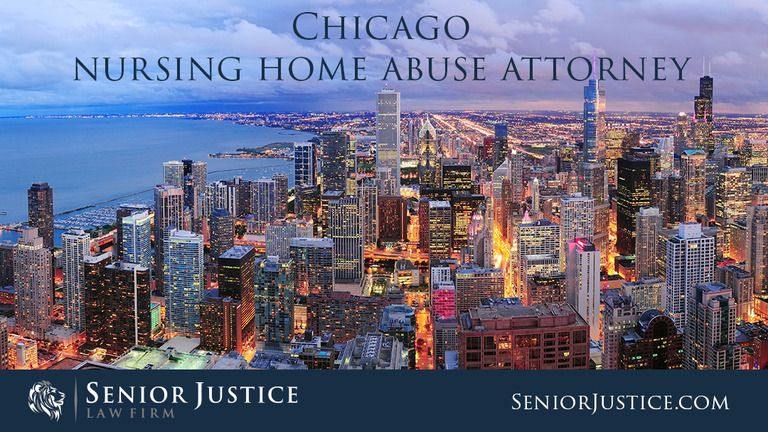
Chicago, Illinois has a population of 2.7 million people—nearly a quarter of the population of the whole state. That makes Chicago a hub for nursing homes as well, with dozens of facilities located in the city center hosting hundreds of beds for older residents.
Unfortunately, whether due to understaffing, administrative practices, or other circumstances, Chicago nursing homes are oftentimes less than stellar in quality of care.
That means that someone you love could end up the victim of abuse or neglect inside a Cook County facility. In fact, a resident of a Chicago nursing home is twice as likely to suffer abuse or neglect as a resident of a downstate Illinois nursing home.
Another vital element of the nursing home negligence problem in Chicago is lack of support from neighboring locations. Illinois is unique in that staff from out of state are not allowed to work in Chicago without getting a new license to practice.
As a result, numbers of Chicago nurses are low since they must have been licensed within Illinois, keeping out nurses from nearby Indiana, Wisconsin, and Western Michigan.
Senior Justice Law Firm has worked for a combined total of 50 years to ensure that the elderly and vulnerable in nursing homes receive the justice they deserve. The hardest thing about elder abuse is recognizing it (more below on this), since oftentimes, the victim is non-verbal.
If you think that someone you love has suffered negligence or abuse inside an Illinois nursing home or ALF, contact our nursing home abuse attorneys in Chicago about your situation and we can help you determine what to do.
Our only focus is to protect the elderly from nursing home abuse, which has allowed us to recover multi-million dollar lawsuits for victims.
Types and Signs of Nursing Home Abuse
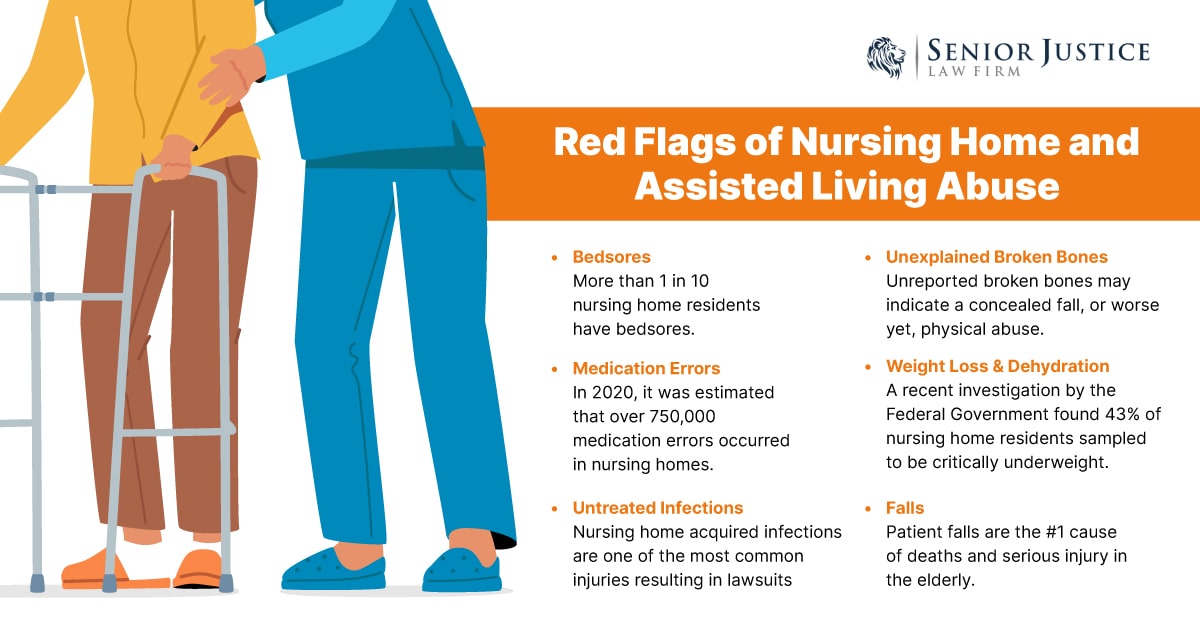 Nursing home abuse can arise in several different ways. The forms of nursing home abuse that can warrant a lawsuit include:
Nursing home abuse can arise in several different ways. The forms of nursing home abuse that can warrant a lawsuit include:
- Neglect,
- Physical abuse,
- Emotional abuse,
- Falls resulting in injuries,
- Financial abuse,
- Sexual abuse, and
- Wrongful death
The different forms of abuse are explained in more detail below.
Neglect
Nursing home neglect is defined in the Illinois Nursing Home Care Act (210 ILCS 45) as a facility’s failure to provide, or willful withholding of, adequate medical care, mental health treatment, psychiatric rehabilitation, personal care, or assistance with activities of daily living that is necessary to avoid physical harm, mental anguish, or mental illness of a resident. Signs of nursing home neglect may include:
- Unsanitary rooms or common areas,
- Lack of adequate supervision,
- Poor hygiene for residents,
- Dangerous conditions in the facility,
- Improper use of restraints,
- Negligent hiring methods, and
- Withholding medical care.
Nursing home neglect may start with minor oversights but can spiral out of control quickly without proper attention. Neglectful care can result in bedsores, lethargy, and depression for victims. If you suspect nursing home neglect, contact a Chicago nursing home abuse attorney today.
Physical Abuse
Physical abuse is often the first kind of abuse someone thinks of when you mention nursing home abuse. Some physical abuse leaves external signs like bruises or scrapes. Physical abuse can include strikes, kicks, or pushes. Common injuries inflicted by physical nursing home abuse include:
- Broken bones,
- Unexplained wounds,
- Black eyes,
- Excessive bruises or scratches, and
- Head injuries.
If your loved one resides in a nursing home and is experiencing physical abuse, contact one of our nursing home abuse lawyers in Chicago as soon as possible.
Falls
The Illinois Nursing Home Care Act requires nursing homes to maintain individualized fall risk assessments for each patient and update them annually. Failure to do this can result in nursing home liability. Using physical restraints instead of monitoring patients and conducting adequate risk assessments does not limit nursing home liability.
Nursing home falls can be caused by a combination of factors related to the resident’s physical condition, the environment of the facility, and the level of care provided. Regardless of the reason, a nursing home has a responsibility to keep its residents safe. Some common causes of nursing home falls include:
- Balance issues and mobility impairments
- Cognitive impairments
- Medication side effects
- Wet or slippery floors
- Improper or defective safety equipment
If your loved one suffered injuries due to a fall in a nursing home caused by negligence, our Chicago nursing home lawyers can help hold the facility liable so it doesn’t happen again.
Emotional Abuse
Emotional abuse is typically harder to discover than physical abuse because the signs are less obvious. Instead of inflicting physical injury, emotional abuse inflicts psychological damage by making the victim feel fear, stress, or embarrassment. Emotional abuse in a nursing home can consist of:
- Intimidating or threatening a resident,
- Yelling or shouting at a resident,
- Ignoring a resident,
- Insulting a resident,
- Preventing a resident from participating in social activities, and
- Blackmailing a resident.
Although emotional abuse may not leave obvious signs of injury, it can still inflict devastating harm like depression and anxiety. Contact our Chicago nursing home neglect attorneys to discuss ways you can report suspected abuse.
Financial Abuse
Financial abuse occurs when a caretaker uses their influence over a senior citizen to exploit them financially. This can include:
- Stealing a debit or credit card from a resident,
- Forging a resident’s signature on a financial document, or
- Stealing a resident’s money.
Criminals often target elderly individuals in hopes that no one will realize the money is missing. Family members should pay close attention to their loved one’s bank accounts and credit card statements to help prevent ongoing financial abuse.
Sexual Abuse
Sexual abuse in a nursing home occurs when someone engages in nonconsensual sexual activity with a nursing home resident. That can include any form of sexual activity, from sexual battery to rape. Signs of sexual abuse include:
- Sexually transmitted diseases,
- Torn or bloody underwear,
- Genital pain or bruising,
- Agitation or panic attacks,
- Depression or social withdrawal, and
- Allegations of sexual abuse from the victim.
Sexual abuse does not include situations in which two nursing home residents engage in consensual sexual activity. If you suspect nursing home sexual abuse, contact a Chicago nursing home abuse lawyer at Senior Justice Law Firm today.
Wrongful Death
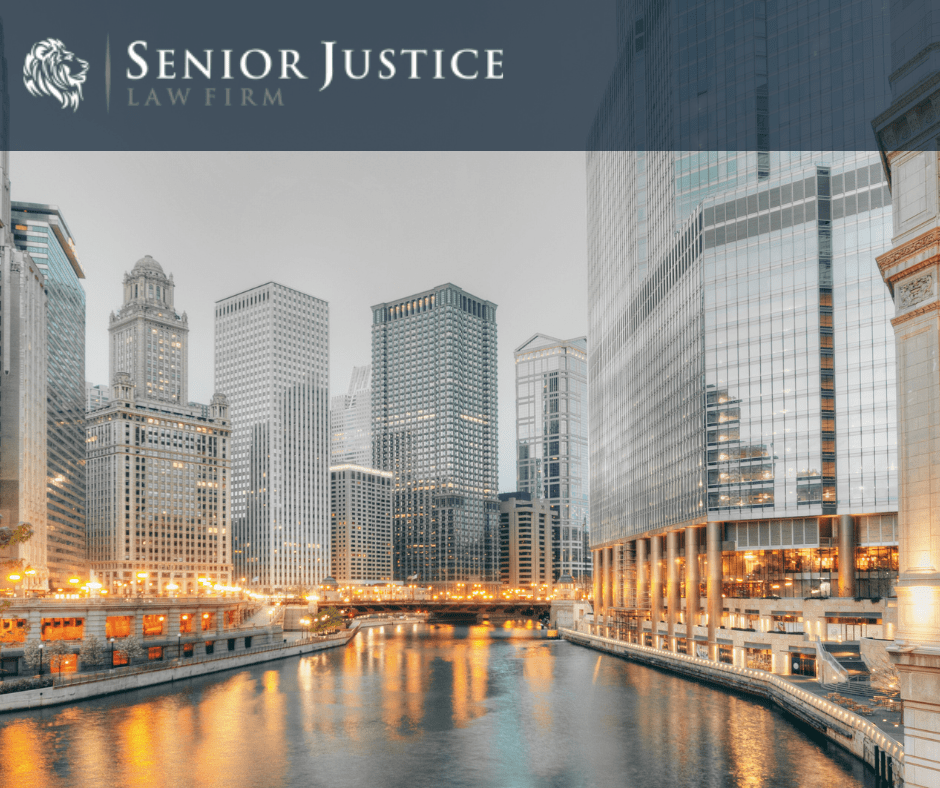
Negligence and misconduct in some nursing home facilities lead to avoidable deaths. Key contributors include the following.
- Falls and fractures. Seniors, due to age and health conditions, are susceptible to falls. Without proper supervision and safe environments, falls can lead to fatal injuries.
- Bedsores and infections. Neglect might cause bedsores. When left untreated, bedsores can become infected. Advanced infections might lead to fatal conditions like sepsis.
- Medication errors. Incorrect doses, wrong medicines, or a mix-up can lead to severe health complications and death.
- Choking and feeding issues. Elderly patients, especially those with swallowing problems, need attentive assistance during meals. Neglect can result in a patient trying to eat on their own and choking.
- Dehydration and malnutrition. A lack of adequate hydration and nutrition can lead to severe health decline, affecting vital organs and leading to death.
- Physical and emotional abuse. Unthinkable as it is, there are cases of abuse in nursing homes. Such abuse can result in psychological trauma, injuries, or fatalities.
- Understaffing. An understaffed facility cannot meet the needs of its residents adequately. That can lead to oversights, neglect, and errors that have fatal consequences.
Losing a loved one under any circumstances is an emotional ordeal. However, when their death results from negligence in a nursing home, the grief is intensified. A Chicago nursing home wrongful death attorney at Senior Law Firm can help
Experience Matters. Our Nursing Home Abuse Attorneys Have It.
How Nursing Homes Stack Up in Chicago
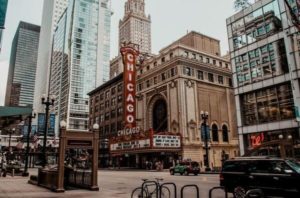
Out of the millions of people who live in Chicago, around 12.7% are older than 65. With so many elderly residents, the city has been forced to open more and more nursing homes in order to provide enough care.
However, that growth has corresponded to a similar decrease in the overall average level of care quality. Dozens of the city’s nursing homes have earned a rating of only 1 star out of 5, and of these, nearly 50% have directly received criticism from inspectors for confirmed cases of abuse.
56 nursing homes in Chicago itself have achieved only the minimum rank of 1 out of 5 possible stars. Of these, 25 are located directly within the Chicagoland metropolitan area, and 13 of these—that is, nearly half—have been cited with Medicare’s “red hand” indicator of confirmed abuse.
The following Chicagoland nursing homes have a 1 star rating, as per CMS in June 2022:
| Facility Name | Address |
|---|---|
| Kensington Place Nursing & Rehab | 3405 South Michigan Avenue Chicago, IL 60616 |
| Symphony of Bronzeville | 3400 South Indiana Chicago, IL 60616 |
| Community Care Center | 4314 South Wabash Avenue Chicago, IL 60653 |
| Little Village Nursing & Rehab Center | 2320 South Lawndale Chicago, IL 60623 |
| Woodbridge Nursing Pavilion | 2242 North Kedzie Chicago, IL 60647 |
| Austin Oasis | 901 South Austin Blvd Chicago, IL 60644 |
| Sheridan Village Nursing and Rehabilitation Center | 5838 North Sheridan Road Chicago, IL 60660 |
| Villa at Windsor Park | 2649 East 75th St Chicago, IL 60649 |
| Aperion Care West Ridge | 6450 North Ridge Blvd Chicago, IL 60626 |
| Waterfront Terrace | 7750 South Shore Drive Chicago, IL 60649 |
| Bethesda Rehab & Senior Care | 2833 North Nordica Avenue Chicago, IL 60634 |
| Lakefront Nursing & Rehab Center | 7618 North Sheridan Road Chicago, IL 60626 |
| Southpoint Nursing & Rehab Center | 1010 West 95th Street Chicago, IL 60643 |
| Warren Barr South Loop | 1725 South Wabash Chicago, IL 60616 |
| Estates of Hyde Park | 4505 South Drexel Chicago, IL 60653 |
| Mado Healthcare – Uptown | 4621 North Racine Avenue Chicago, IL 60640 |
| Symphony of Chicago West | 5130 West Jackson Boulevard Chicago, IL 60644 |
Disclaimer
*The CMS star rating of the above facilities is current as of June 20, 2022 and subject to change. The inspection results are provided from public government agency surveys. The state Department of Health conducts a survey of all nursing home facilities at least once every 15 months. You may find the most up to date information at medicare.gov. This material is not endorsed by the facility noted or by any governmental agency.
Injuries, hospitalization, agitation, changes in personality, and reduced quality of living should always be taken seriously. At Senior Justice Law Firm, we understand that you might not know what to do when presented with evidence of poor care or a family member’s injury.
Reach out and we can help you take the next steps to properly report the events and keep your loved one—and others at the same facility—safe from harm.
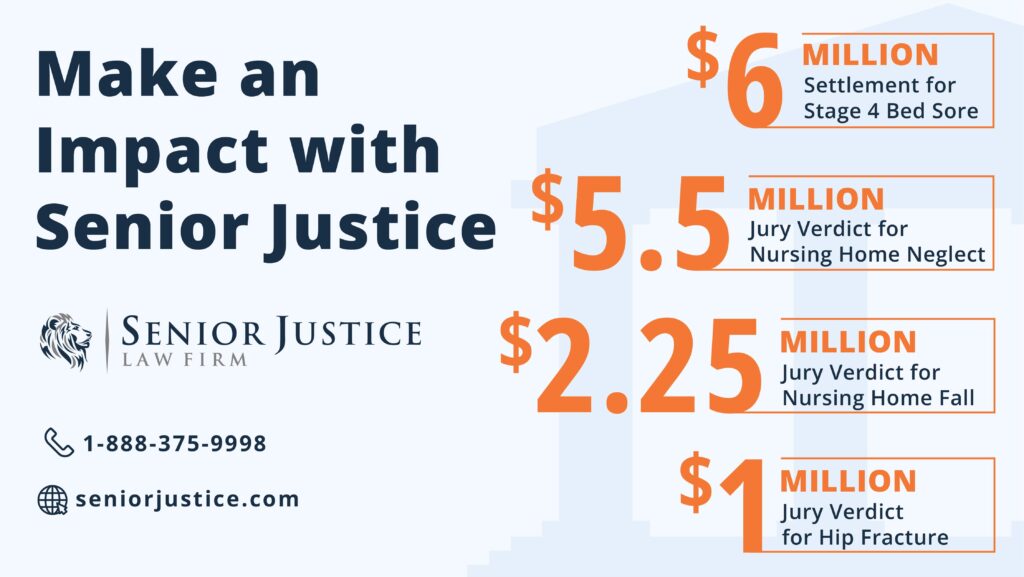
What a Chicago Nursing Home Lawsuit Can Do for You
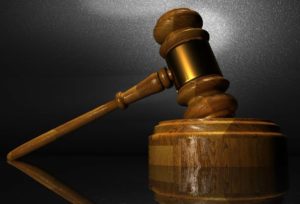
If you believe a vulnerable adult has been victimized by nursing home negligence in Chicago, you should report the abuse or neglect to the appropriate Illinois authorities.
Though all these organizations can assist you in various ways, administrative agencies are not capable of obtaining financial repayment for your loved one’s suffering. Financial compensation can only be achieved through a Cook County nursing home abuse lawsuit.
Not all Chicago nursing home abuse lawsuits go to trial. In fact, more than 90% of these cases settle out of court, before trial. Due to the extensive amount of cases Senior Justice Law Firm brings against nursing home corporations, we know the players involved.
Leveraging the experience of our Chicago nursing home abuse lawyers, we can oftentimes get cases resolved if that is the family’s desire. Alternatively, if you do not want to settle your case, we are happy to file a Chicago nursing home abuse lawsuit and pursue the case into litigation.
On top of securing financial compensation for the event, a lawsuit can also have dramatic effects for the others who live in a nursing home. When you deal a financial blow to a facility, you drive permanent change to practices as the nursing home attempts to avoid further payouts in the future.
This can mean better care for those who rely on that nursing home for their well-being. Your Chicago elder abuse lawsuit may change the lives of people you have never met so that other families can avoid the same pain and suffering that your loved one endured.
The details of your case will influence what kinds of damages you can seek. If your family member incurred hospital and medical bills, for example, the lawsuit may seek economic damages to recoup those payments. However, the majority of damages in nursing home negligence claims are pain and suffering damages. These are also called human losses. Illinois law defines “pain and suffering” as the physical and emotional anguish, distress, or turmoil caused by a physical injury or death.
Making Change with Every Chicago Nursing Home Abuse Case We Bring
We understand that these cases are about much more than money. When a family retains us as their Chicago nursing home abuse attorney, we seek not only monetary compensation, but real justice.
So what does justice look like in an Illinois nursing home negligence case? The idea behind a civil claim against a nursing home is to compensate the family for things like medical bills and pain and suffering. Another purpose in bringing a claim is to financially punish the offending nursing home for carelessly allowing its resident to get hurt.
When you bring a nursing home negligence claim, you are telling the nursing home ‘do not let this happen again.’ This kind of punishment gets the attention of the corporate board of directors, since most Chicago nursing home abuse lawsuits settle above $100,000. This is real money, and results in real change.
Unfortunately, most corporate higher ups are unmoved by angry letters from families, Department of Health complaints, or negative Yelp reviews. They only care about money. If you take their money via a civil injury claim, you get their attention.
This is the kind of justice our Chicago nursing home abuse attorney attempts to achieve on every one of the cases we accept.
Statute of Limitations for Nursing Home Abuse Cases in Chicago
Generally, the injured party has two years from the date they knew or reasonably should have discovered their injury to file their lawsuit. Certain exceptions can extend this two-year statutory period, such as when the victim lacks mental capacity to appreciate the extent of their injuries.
A Chicago nursing home abuse lawyer can review the details of your case and determine when your statutory period begins. Our team of nursing home abuse attorneys in Chicago at Senior Justice Law Firm can help ensure your lawsuit is filed before the statute of limitations expires.
Potential Damages in a Nursing Home Abuse Lawsuit
In a civil lawsuit, you recover compensatory damages. That means the damages are designed to compensate you for the harm that you suffered as a result of the nursing home neglect. Common damages in a nursing home neglect case can include:
- Hospital bills,
- Costs of counseling,
- Rehabilitation costs,
- Long- or short-term inpatient care,
- Costs of medical equipment,
- Financial losses, and
- Physical and mental pain and suffering.
Our Chicago nursing home neglect attorneys can compile invoices and other documents to calculate the full extent of your loved one’s losses.
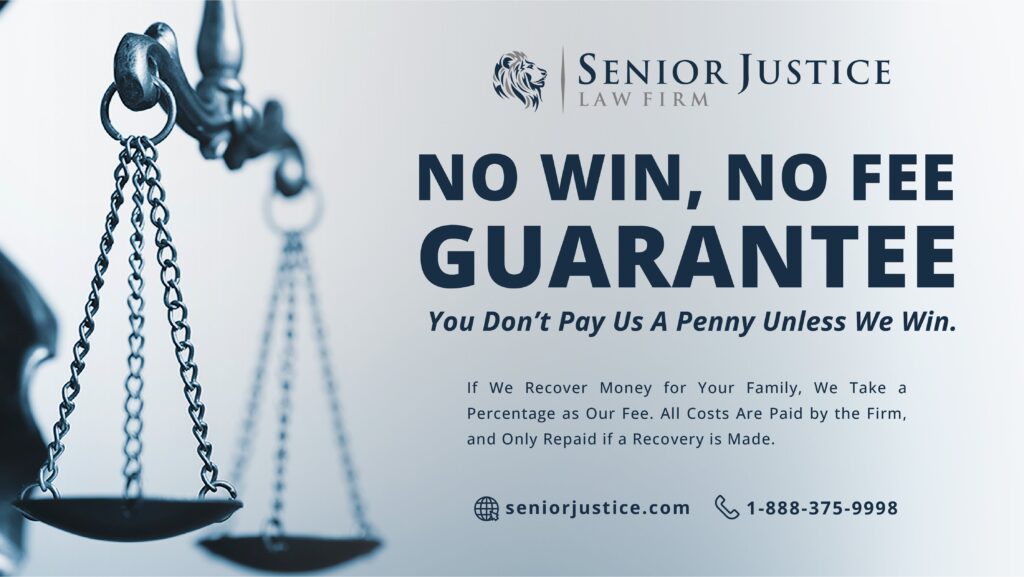
Chicago Nursing Home Abuse Lawsuits in the News
The Chicago area and Illinois as a whole are full of examples of successful lawsuits against nursing homes for abusive and negligent behavior.
One resident broke his hip after repeated near-falls and trips in a facility outside Chicago. The location failed to implement any changes to his care or living space to mitigate the risk of further falls, and his family was reportedly not surprised to discover that he later fractured his pelvis. The nursing home later settled with the family for more than $150,000 as compensation.
However, falls continue to be one of the leading drivers behind legal action taken against Chicago nursing homes. In another similar case, a woman was awarded more than $800,000 in damages after she had repeatedly fallen within a facility. Though the facility did note each of her falls, they did not make substantive changes to prevent similar instances in the future. When one fall resulted in a broken hip that significantly impacted her mobility going forward, her case proceeded to legal action.
Falls are not the only problem that these nursing homes face in Chicago. In another incident, a man was admitted to Sherman Medical Center as a result of what appeared to be a fever. It was later discovered that he had not been properly cared for, with his oral hygiene neglected and his body wracked with bedsores. The Illinois Department of Health opened an investigation into the nursing home from which he had arrived, though unfortunately, he passed away before the case could be resolved. It is believed that his fatal staph infection arose at least in part from his open bedsore wounds.
Sadly, the Illinois Department of Health continues to rack up care violations against Chicago area nursing homes. There were numerous “AA” violations cited in the first quarter of 2022, including those resulting in pressure sores, improper catheter care, poor infection control, failing to provide assistance with eating to prevent a resident from choking, and failing to supervise a resident with known sexual behaviors to protect another resident from sexual abuse.
How to Report Nursing Home Neglect in Chicago
For residents of Chicago, your first step when you suspect nursing home abuse or neglect should be to get in touch with your ombudsman. There are multiple branches that serve the city, so you should contact the one associated with the area where your loved one is located. Since Chicago is so large, it has a dedicated ombudsman presence separate from the Illinois statewide branch.
Attorney Tip – Reporting Nursing Home Abuse
Report elder abuse right away. Facilities only keep surveillance video for a limited time.
After contacting your ombudsman, there are several organizations that can help you further. A useful tool in reporting nursing home abuse is the Healthcare and Family Services for Supportive Living Facility Complaints helpline, which you can call confidentially at 1-800-226-0768. This resource can help you learn what you need to know to report your case.
The Senior HelpLine, which you can call at 1-800-252-8966, can help you make sure your report reaches the right people. They can also connect you with others who can help you if you don’t know where to take your report next. The Illinois Department of Public Health pays close attention to complaints about nursing homes submitted to their Central Complaint Registry. The best way to contact them is through an online report, as their hotline (1-800-252-4343 or 1-800-547-0466 (for TTY)) is often busy with other callers.
Though all of these services provide assistance essential to obtaining justice and ensuring better care for nursing home residents all over Chicago, they are not meant to deal with emergencies. If your loved one has a medical problem and needs immediate help, call 911. You can reach out to these other resources once your family member is being seen by a medical professional.
Illinois’ police can also help you. They have a Medicaid Fraud Control Unit at 1-888-557-9503, which is intended for investigating possible fraud related to Medicaid billing from nursing homes. If your loved one has suffered abuse or neglect, has arranged an appointment but never received the visit, or has had their prescriptions given incorrectly or ignored entirely, this service may be just what you need.
If you need assistance with reporting nursing home abuse, contact the Chicago nursing home abuse attorneys at Senior Justice Law Firm today: (773) 739-8250. We are happy to assist.
Schedule a Consultation with a Chicago Nursing Home Abuse Lawyer
If you suspect that your loved one suffered abuse or neglect in a Chicago nursing home, it is imperative that you take action immediately. Contact your ombudsman and the other resources described above, and begin a conversation with a Chicago nursing home abuse lawyer today. Starting early will ensure that witnesses are contacted timely and crucial evidence is preserved.
At Senior Justice Law Firm, it is our mission to help right the wrongs done due to nursing home negligence. Since we have a combined total of more than 50 years of experience in this field, we succeed where other firms have failed. Our attorneys have recovered millions of dollars for families across Chicago and Illinois as a whole.
Contact us over the phone or using our online chat tool at your convenience. Consultations are completely free, and we would love to talk about what you can do following evidence of nursing home abuse or neglect in Chicago. You deserve justice, and at Senior Justice Law Firm, we are proud to offer our services to help you seek it.
Speak with an experienced Chicago nursing home abuse attorney by calling us at (773) 739-8250, or type your case facts below.










